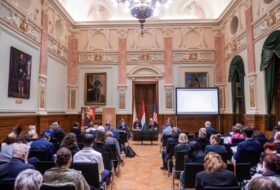István Nagy welcomed the evening’s guests. The Chairman of the Board of our Foundation expressed his gratitude that this year again, nearly 200 people gathered to honour Otto von Habsburg—among them members of the Habsburg family, including Georg and Eilika von Habsburg, and Severin Meister, son of Gabriella von Habsburg; as well as members of the Board, speakers of the conference on Friday, diplomatic representatives, and leaders of Hungarian public collections and organisations. He also took the opportunity to reflect on the past year and to express appreciation to our staff for their work.
Afterwards, Director Gergely Prőhle explained that this year’s dinner and the previous day’s conference had focused on our namesake’s British connections, particularly his relationship with Sir Winston Churchill. Then, he invited Ferenc Kumin, Ambassador of Hungary to the United Kingdom, to take the stage. The diplomat recalled that our cooperation had begun with a joint conference in London in June. At that event, it was noted that in 2007, Otto von Habsburg had been bestowed with the prestigious’ Freeman of the City’ award by the Worshipful Company of Gardeners, a body with a seven-hundred-year history, for his life-long commitment to Europe. Among the many notables present at the summer conference were Adam Fergusson, a fellow MEP, a friend of Otto von Habsburg, a renowned economist and journalist, and author of the best-selling book When Money Dies. The event in June was an excellent opportunity for our country to present the objectives of this presidency of the Council of the European Union, while at the present dinner, we reflected on the former MEP’s thoughts as we approach the end of the six-month term,” the ambassador remarked.
The dinner’s guest of honour was Lord David Alton of Liverpool, a member of the House of Lords, who addressed the gathering, drawing attention to the common ground between Otto von Habsburg and Winston Churchill, who was born 150 years ago and also shared some of his memories of our namesake. He stated: “In these dispiriting and troubled times, we need the inspiration and example of two men who knew that without security and stability, there could be no economic prosperity or progress. Both men knew that politics and politicians had to speak to the anxieties of the times—not to do so would open the door to populism, autocrats, and extremism. Both gravitated to the politics of the centre. Both men had a vision of the dangers posed by dictatorship to the world’s democracies. Both identified the curse of Nazism. Both loathed antisemitism and spoke up for the persecuted Jews. Both saw in Stalin a continuation of the barbarism of Hitler. Both were passionate in their belief in democracy, the rule of law, and the upholding of human rights and human dignity. Both were committed to a pan Europeanism—which meant the whole of Europe—represented by the empty chair for the missing States in the European Parliament and more recently poignantly left out for the now deceased Alexei Navalny—and, while Churchill coined the phrase «the iron curtain», both men knew it wouldn’t last forever.” Lord Alton’s speech can be read in its entirety by clicking HERE.
To add a dash of colour to the evening, a napkin ring with the Apponyi pattern was included in the table setting—for the first time this year. The Habsburg family had been regular customers of the Herend Porcelain Manufactory since 1855. Otto had visited Herend several times, as he greatly admired the renowned Hungarian craftsmanship brand. One of the Manufactory’s most popular motifs to this day is named after the distinguished diplomat and politician, Count Albert Apponyi, one of the foremost supporters of the former Crown Prince in Hungary, who was one of the initiators of the tradition of dinners celebrating Otto’s birthday in the 1920s, which were held at first in the Hotel Gellért and later in the Pesti Vigadó. Gergely Prőhle underlined that the napkin rings serve as a reminder that the Otto dinner guests are part of a community that spans generations, supporting the ideals represented by Otto von Habsburg and contributing to the preservation of the memory of our namesake by following the activities of the Foundation.
Interspersing the speeches, the audience was treated to a performance by pianist Balázs Fülei of Ludwig van Beethoven’s Seven Variations on ‘God Save the King’ and, in tribute to the Scottish-born Adam Fergusson, the Six Scottish Dances (Écossaises).
Photos by Zoltán Szabó




























